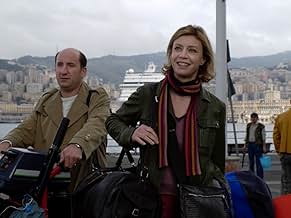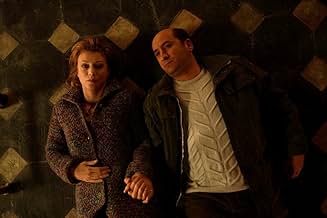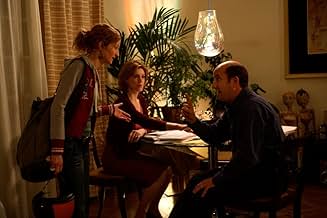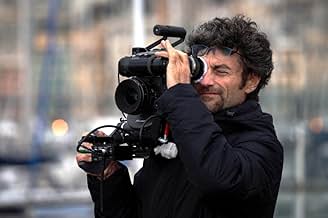IMDb RATING
6.9/10
3.1K
YOUR RATING
A well-off and sophisticated couple struggles to stay together after the husband loses his job.A well-off and sophisticated couple struggles to stay together after the husband loses his job.A well-off and sophisticated couple struggles to stay together after the husband loses his job.
- Awards
- 6 wins & 35 nominations total
Featured reviews
10fouadice
"Giorni e nuvole" (2007) is a poignant exploration of love, loss, and resilience. The film beautifully captures the essence of life's unpredictability, showcasing the impact of financial crisis on a seemingly perfect family. The performances are exceptional, particularly by the lead actors, whose chemistry is palpable. The cinematography is stunning, enhancing the emotional depth of the narrative. Director Silvio Soldini crafts a delicate balance between drama and hope, making the viewer reflect on their own relationships. This film is a masterpiece that resonates long after the credits roll, deserving a solid 10-star rating for its heartfelt storytelling and artistic brilliance.
Giorni e Nuvole is a poignant and deeply human exploration of the fragility of economic security and the resilience of love. Directed by Silvio Soldini (Pane e Tulipani), the film follows Elsa (Margherita Buy) and Michele (Antonio Albanese), a well-off middle-aged couple in Genoa, whose lives unravel after Michele loses his job but hides it from Elsa for months.
The film is not just about job loss-it's about identity, pride, and the shifting power dynamics in a long-term relationship. Elsa, who has just completed her art history degree and quit her job to follow her passion, is suddenly thrust into financial uncertainty. Michele, meanwhile, struggles with his pride and a sense of emasculation in a society where success is still very much tied to male status.
Silvio Soldini masterfully captures the slow, emotional descent of the couple's life: the loss of comforts, the strain on communication, and the raw vulnerability that emerges. The film avoids melodrama, instead relying on subtle performances and realistic dialogue. Margherita Buy delivers a particularly nuanced performance-Elsa is dignified yet visibly unraveling. Antonio Albanese's portrayal of Michele is restrained but powerful, evoking sympathy even when his character makes frustrating choices.
Cinematographically, the film leans into cold blues and grays, reflecting the mood of uncertainty and loss. The pacing is deliberate, mirroring how life's biggest changes often come not as explosions, but as a slow crumbling.
The film is not just about job loss-it's about identity, pride, and the shifting power dynamics in a long-term relationship. Elsa, who has just completed her art history degree and quit her job to follow her passion, is suddenly thrust into financial uncertainty. Michele, meanwhile, struggles with his pride and a sense of emasculation in a society where success is still very much tied to male status.
Silvio Soldini masterfully captures the slow, emotional descent of the couple's life: the loss of comforts, the strain on communication, and the raw vulnerability that emerges. The film avoids melodrama, instead relying on subtle performances and realistic dialogue. Margherita Buy delivers a particularly nuanced performance-Elsa is dignified yet visibly unraveling. Antonio Albanese's portrayal of Michele is restrained but powerful, evoking sympathy even when his character makes frustrating choices.
Cinematographically, the film leans into cold blues and grays, reflecting the mood of uncertainty and loss. The pacing is deliberate, mirroring how life's biggest changes often come not as explosions, but as a slow crumbling.
Elsa and Michele are living a comfortable upper middle class life in Genoa ... until Michele is forced out of the company he co-founded. This film examines the effect this event has on Elsa, Michele, their daughter Alice, and their friends. If you are a middle aged person with a good income, then this film will probably touch a raw nerve, since you would have to feel that this could happen to you; if this has happened to you, then you will likely doubly feel the pain.
The film is brutally honest as it shows how Elsa and Michele give up their comforts one step at a time. After Elsa recovers from the initial shock, she is quite practical in looking for work, any kind of work. But it's different for Michele. He has been used to being the breadwinner and deals with serious issues like humiliation, wounded pride, and feelings of worthlessness--one day he was a key player in his work and family and the next day he feels he is nothing. He is so embarrassed that he cannot even reveal the truth to his daughter until she makes an independent discovery of it. Friendships are severely impacted. What has happened to Michele and Elsa has happened to thousands since the economic downturn and their reactions are not atypical, but their story is laid out here in a very affecting manner.
Antonio Albanese (as Michele) and Margherita Buy (as Elsa) turn in very believable performances. No great tricks in cinematography or time sequencing, just straightforward, solid filmmaking.
Life goes on and people cope, but I think it would be difficult to watch this film without responding to its intense emotional content. No matter what your status, it's always hard to take several steps back. Money, work, and status are important and, as illustrated in this film, I think it is the unusual person who can withstand a serious blow in any one of those areas and come out the better for it.
The film is brutally honest as it shows how Elsa and Michele give up their comforts one step at a time. After Elsa recovers from the initial shock, she is quite practical in looking for work, any kind of work. But it's different for Michele. He has been used to being the breadwinner and deals with serious issues like humiliation, wounded pride, and feelings of worthlessness--one day he was a key player in his work and family and the next day he feels he is nothing. He is so embarrassed that he cannot even reveal the truth to his daughter until she makes an independent discovery of it. Friendships are severely impacted. What has happened to Michele and Elsa has happened to thousands since the economic downturn and their reactions are not atypical, but their story is laid out here in a very affecting manner.
Antonio Albanese (as Michele) and Margherita Buy (as Elsa) turn in very believable performances. No great tricks in cinematography or time sequencing, just straightforward, solid filmmaking.
Life goes on and people cope, but I think it would be difficult to watch this film without responding to its intense emotional content. No matter what your status, it's always hard to take several steps back. Money, work, and status are important and, as illustrated in this film, I think it is the unusual person who can withstand a serious blow in any one of those areas and come out the better for it.
10enamcaty
*Days and Clouds* (2007) is an Italian drama film directed by Silvio Soldini. It follows Elsa and Michele, a wealthy middle-aged couple whose comfortable life shatters when Michele loses his job. Elsa, an art historian, is forced to take small jobs while Michele struggles with pride and despair. Their once-loving relationship strains under financial stress, leading to personal transformation and a reassessment of their priorities. The film explores themes of economic instability, resilience, and love in adversity, portraying a realistic and emotional journey of adaptation and rediscovery.woww!
Days and Clouds (2007)
Tender, true, and rather moving without being the slightest bit sentimental. This is a look at normal life, in a way, in modern Northern Italy (the setting is Genoa). A fairly comfortable middle aged couple is going through a crisis as one loses a job and the money crunch adds to other everyday stresses.
And that's it. Which is a lot when you realize that that's it. There will be no murder or shocking accidents, no illness or surprise turn of events of any kind, really. Which is why it draws you further and further, gently, with more humor than pathos, until you really believe these people, or these kind of people, exist quite like this. It's not a random slice of life, since there is certainly a core problem being scrutinized (the loss of a job in mid-life, etc.). But in many ways the little events are so "little" in the cinematic sense they are just a small pageant for the viewer.
So what makes it sing beyond the compelling, restrained story is the acting, above all the acting. The couple, the husband and wife facing the crisis, makes sense because the woman (Margherita Buy) and the man (Antonio Albanese) are so perfect at being imperfect. They don't push their crisis too hard, nor do that have the ideal love at the beginning. What they show is the normal troubled tenderness and awkward anger of getting into such a situation.
Besides a second thread following somewhat their daughter's life, which has taken a less materialistic turn then the parents, the movie adds a whole other element throughout--early Renaissance art. The mother happens to have just finished (belatedly) her graduate degree in Italian art from the 1400s. And she is helping restore an obscure small ceiling painting somewhere else in town, seeing it gradually reveal itself as the movie progresses. The reason this matters is it adds an element of beauty and idealism that is implied by the whole rest of the movie. That we (all of us) are not simply here to make ends meet and worry about money. And this something bigger (call it art, call it something spiritual inspired by art or inspiring art) is what holds us up at times.
So by the end the two aspects--the mundane and the ethereal--meld, every so softly. Quite beautiful.
Tender, true, and rather moving without being the slightest bit sentimental. This is a look at normal life, in a way, in modern Northern Italy (the setting is Genoa). A fairly comfortable middle aged couple is going through a crisis as one loses a job and the money crunch adds to other everyday stresses.
And that's it. Which is a lot when you realize that that's it. There will be no murder or shocking accidents, no illness or surprise turn of events of any kind, really. Which is why it draws you further and further, gently, with more humor than pathos, until you really believe these people, or these kind of people, exist quite like this. It's not a random slice of life, since there is certainly a core problem being scrutinized (the loss of a job in mid-life, etc.). But in many ways the little events are so "little" in the cinematic sense they are just a small pageant for the viewer.
So what makes it sing beyond the compelling, restrained story is the acting, above all the acting. The couple, the husband and wife facing the crisis, makes sense because the woman (Margherita Buy) and the man (Antonio Albanese) are so perfect at being imperfect. They don't push their crisis too hard, nor do that have the ideal love at the beginning. What they show is the normal troubled tenderness and awkward anger of getting into such a situation.
Besides a second thread following somewhat their daughter's life, which has taken a less materialistic turn then the parents, the movie adds a whole other element throughout--early Renaissance art. The mother happens to have just finished (belatedly) her graduate degree in Italian art from the 1400s. And she is helping restore an obscure small ceiling painting somewhere else in town, seeing it gradually reveal itself as the movie progresses. The reason this matters is it adds an element of beauty and idealism that is implied by the whole rest of the movie. That we (all of us) are not simply here to make ends meet and worry about money. And this something bigger (call it art, call it something spiritual inspired by art or inspiring art) is what holds us up at times.
So by the end the two aspects--the mundane and the ethereal--meld, every so softly. Quite beautiful.
Did you know
- TriviaOrietta Notari's debut.
- SoundtracksSono Tremendo
Written by Giosy Capuano (as G.Capuano), Mario Capuano (as M.Capuano) and Danilo Ciotti (as A.D.Ciotti)
© Edizioni Chappell, S.r.l. / Fonit Cetra Music Publishing, S.r.l.
Performed by Pivio & Tuscolano Brothers
Courtesy of Warner-Chappell Music (Italiana), S.r.l.
Details
Box office
- Budget
- €300,000 (estimated)
- Gross US & Canada
- $112,102
- Opening weekend US & Canada
- $16,707
- Jul 13, 2008
- Gross worldwide
- $6,966,224
- Runtime1 hour 58 minutes
- Color
- Sound mix
- Aspect ratio
- 1.85 : 1
Contribute to this page
Suggest an edit or add missing content





























